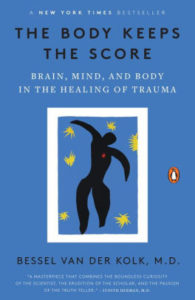
Did you know that your attachment as a baby with your primary caregiver (usually your mother*) may affect whether you will get Post-Traumatic Stress Disorder (PTSD) if you experience trauma?
I am reading a book called The Body Keeps the Score: Brain, Mind and Body in the Healing of Trauma by Bessel Van Der Kolk, M.D. In Chapter 7, entitled “Getting on the Same Wavelength: Attachment and Attunement,” the author gives a brief overview of a psychological development theory called Attachment Theory. Attachment Theory says that if a baby is securely attached to their mother, they will be able to weather the storms of life. Attachment theorists John Bowlby and Mary Ainsworth spent a lot of time studying the interactions between mothers and their babies to see what mothers do to help their babies become securely attached. “Good enough” mothers are attuned to their babies’ emotions. These mothers are able to learn what each different cry of their baby means. They can tell you if the child is hungry, tired or sick.
Babies and mothers who are in tune with each other mirror the expressions of the other. One researcher stuck out his tongue at 6-hour old babies, and the babies immediately stuck their tongues out in response! When babies and their mothers are in sync with each other on an emotional level, they are also in sync physically. When a baby is in sync with the mother, the baby’s sense of connection is reflected in a steady heartbeat and breathing, and a low level of stress hormones. The mother and the child mirror each other’s voice and facial expressions. This helps the child build an internal locus of control, which is a key part of learning to cope with whatever the child experiences in life. When the mother and the child are in sync, the child learns that the world is a safe place and that he/she can positively affect his/her environment.
Van Der Kolk shares two scenarios that describe whether a mother is in tune with her child.

In Tune Mother
A mother was playing with her son. They were cooing to each other and having a wonderful time. Then, the mother leaned in to nuzzle him, and the baby, in his excitement, yanked her hair. The mother yelped in pain, and her face became angry. The baby let go and they pulled away from each other. The frightened baby put his hands over his face to block out the sight of his mother. The mother realized he was upset, and she began making soothing sounds to calm him down. In just a few moments, he moved his hands away from his eyes and looked to see if the coast was clear. The mother reached toward him with a concerned expression. She began tickling his belly and he began to giggle. Their harmony was reestablished, and they were in tune again.
 Out of Tune Mother
Out of Tune Mother
This mother has difficulty mirroring her baby and being sensitive to what her baby needs. In this scenario, the mother and baby began looking and smiling at each other. The baby grew tired and looked away from his mother briefly. The mother could not tell that the child needed a momentary break. She bent down and put her face in front of the child. When he pulled away even more, she began speaking louder and poking him to get him to look at her again. At this point, the baby was truly aggravated and began crying. Instead of soothing the child, the mother jostled him roughly. Soon, he is wailing, and the mother gave up in frustration. An out of sync mother does not learn how to calm her child, which often makes her feel like a failure. She will not enjoy being with her child, who she will view as difficult and unloving. Over time, she will give up trying to comfort him and she will then be more apt to neglect or abuse him.
What Causes a Mother to Be Out-of-Sync with Her Child?
Perhaps you are wondering why some people have trouble synchronizing with their children. This might happen because they were themselves parented by an out-of-sync mother. It may be because they are depressed or suffering from some other mental health issue or have an addiction to drugs or alcohol. It might be because they are preoccupied with their own trauma: abuse, rape, poverty, the death of a loved one. I did not write this blog to shame mothers who are out of sync, but to identify the problem, and offer some ideas for solutions.
How Can Being Raised by an Out-of-Sync Parent Lead to PTSD?
When a mother is unable to meet her baby’s impulses and needs, the baby soon learns to become the mother’s idea of what he should be. He learns to discount his inner sensations and learns that something is wrong with who he really is. He will instead try to please his mother by ignoring his own feelings. This child will become vulnerable to shutting down his body’s feedback. He will be unable to discern whether he is feeling happy and content, or angry and nervous.
Children who are neglected or abused see the people around them as potential threats.  Tweet This
Tweet This
They will be in a constant state of anxiety, wondering what the people around them will do to them. They do not learn how to regulate their own emotions. Some children respond by completely shutting down. These children are more apt to be victimized by others because they do not know how to read the cues of other people. They cannot tell when a person is safe or not safe. Or, these children may become aggressive and learn to victimize others.
People who did not learn how to regulate their own emotions as children are more susceptible to developing PTSD when they experience something traumatic. They are unable to regain their equilibrium when they are violated. In one example of this, a study was done of children who were hospitalized for severe burns. Those who felt safe with their mothers did not develop PTSD, and they required less morphine to control their pain. Those who did not have a secure attachment with their mothers often developed PTSD and needed more painkiller. Their lack of secure attachment affected them both emotionally and physically.
What Can We Do?
If you were raised by a mother who was not in tune with you, you may have many struggles. You may not be able to read your own emotions. You may experience hyperarousal, or you may be completely shut down. Living this way puts you at risk for being victimized by others. What can you do to heal from this? Van Der Kolk gives a few suggestions:
- Seek counseling from a therapist trained in treating trauma
- Get EMDR (Eye-Movement Desensitization and Reprocessing) or IFS (Internal Family Systems) therapy
- Practice mindfulness and grounding
- Learn to inhabit your body by practicing yoga
- Seek brain healing through neurofeedback
- Learn to re-sync with others through dance, theater, chorus.
What can you do if you were raised by an out-of-sync mother, and you are now a parent yourself? First of all, know that you don’t need to be a perfect parent in order to raise a healthy child. All parents make mistakes, and if you are a “good enough” parent, your child will not be adversely affected. But what if you are concerned you are NOT a good enough parent? How can you learn to be in sync with your own child when you did not experience this yourself? Here are a few suggestions:
- Learn from in sync parents around you. Watch how they interact with their babies. Ask them questions. Ask them for feedback about how you relate to your own child.
- Take parenting courses.
- Work with a child psychologist. Ask him/her to help you parent successfully.
- Read books about parenting, especially those that talk about attachment.
I invite you to read The Body Keeps the Score to learn more about attachment, how trauma affects the brain and body, and what can be done to heal from trauma.
If you find yourself in this blog, either as the child, or the parent, remember, you are not alone as you strive for healing.
Isaiah 41:10 says:
So do not fear, for I am with you;
do not be dismayed, for I am your God.
I will strengthen you and help you;
I will uphold you with my righteous right hand.
May you feel God’s love and care for you today.
Caroline
* Whoever your primary caregiver is


